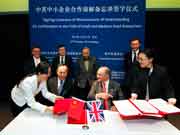 |
| Chinese Premier Li Keqiang (R fear) and his Indian counterpart Manmohan Singh attend a joint press conference in Beijing, capital of China, Oct. 23, 2013. (Xinhua/Ding Lin) |
BEIJING, Oct. 23 -- Indian Prime Minister Manmohan Singh said in Beijing on Wednesday that India and China have resolved to realize the full prominence of their partnership and maintain friendly relations.
"This will be our strategic vision," Singh said at a press briefing together with Chinese Premier Li Keqiang after their talks in the morning.
Singh said he and Premier Li have concluded a very productive round of talks and reached a important understanding on a number of matters.
"First and foremost, we agreed that the prosperity and progress of 2.5 billion Indian and Chinese people will be a major factor of Asian resurgence and global prosperity and stability," Singh said.
Second, he said, he and Li agreed that peace and tranquility in the two countries' border areas must remain the foundation for the growth of the India-China relationship even as they move negotiations toward a fair, reasonable and mutually acceptable settlement to the India-China boundary question. Singh described this as "our strategic benchmark."
Third, Singh said, they agreed that the relationships pursued by India and China with other countries must not become a source of concern for each other. This will be a strategic reassurance, according to the prime minister.
He suggested to premier Li the need to enhance mutual trust, expand common interest and deepen mutual understanding.
To build mutual trust, both sides have agreed to enhance transparency and strengthen strategic communications at all levels, including on the shared neighborhood. Singh proposed expanding cooperation on transborder rivers, and encouraging and institutionalizing greater exchanges between the two countries' armed forces.
He said the agreement on border defence cooperation added to the existing instruments to ensure peace, stability and predictability on the borders.
According to Singh, Li was "receptive" to his concern about the unsustainable trade imbalance between the two countries and both agreed to explore ways to bridge this gap.
India is taking forward the suggestion raised by Li in New Delhi for a Chinese industrial park to act as a magnet for Chinese investment in india, Singh said, adding that they are also exploring the possibility of the Bangladesh-China-India-Myanmar (BCIM) Economic Corridor connecting the two countries via the southern Silk Road.
"We are determined to inject new dynamism to our economic relations by working with wider stakeholders," Singh said.
To boost mutual understanding, both sides have decided to encourage provincial and sub-regional exchanges, institutionalize a high-level media forum, continue rooting exchanges for the next five years and celebrate 2014, the 60th anniversary of the announcement the Five Principles of Peaceful Coexistence as the Year of India-China Friendly Exchanges.
He conveyed to Li India's commitment to visa simplification to facilitate Chinese nationals traveling to India and expressed hope that China will also facilitate such exchanges, while expressing appreciation for China's cooperation in the establishment of Nalanda University.
They also had candid and constructive discussion on regional and global issues of importance to India and China, Singh said, describing this as one of the promising developments in the bilateral relationship.
The agreement and MOUs signed on Wednesday covering joint work in the areas of defence, road transport, transborder rivers, cultural exchanges, Nalanda University and sister-city linkages show impressive scope, he added.
India and China are two ancient civilizations and account for 2.5 billion people on this earth. "When India and China shake hands, the world notices," the prime minister said, adding, "I believe that my visit to China has put our relations on a path of stable and fast growth."
Singh arrived in Beijing on Tuesday night for a three-day official visit to China.

 Five fighters in flight training
Five fighters in flight training Weekly Sports Photos
Weekly Sports Photos  Prince George baptised in London
Prince George baptised in London Festive cheer in Xinjiang
Festive cheer in Xinjiang UK, China to boost SME trade and investment
UK, China to boost SME trade and investment Chinese screen goddesses from Beijing Film Academy
Chinese screen goddesses from Beijing Film Academy  China Int'l Motorcycle Trade Exhibition kicks off in SW China
China Int'l Motorcycle Trade Exhibition kicks off in SW China  Tourists pack Great Wall to view autumnal leaves
Tourists pack Great Wall to view autumnal leaves
Day|Week|Month